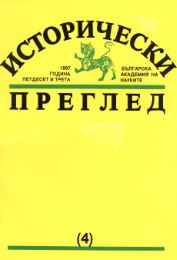Епилогът на съдебното преследване срещу Радославовите министри
The Epilogue of the Prosecution of Radoslavov’s Ministers
Author(s): Todor GalounovSubject(s): History, Political history, Recent History (1900 till today), Interwar Period (1920 - 1939)
Published by: Институт за исторически изследвания - Българска академия на науките
Summary/Abstract: After the June 9, 1923 coup a reassessment began of the rule of the Bulgarian Agrarian People’s Union. In this respect it was quite normal to raise the question also of the fate of Radoslavov’s ministers convicted by the Third State Court. There was no consensus in the political elite then on the question as to what an extent the consequences of the sentence should be extenuated. Whereas the parties of the right-wing political spectrum as a whole were inclined even to grant amnesty to the ministers of the “liberal concentration”, the left opposed such an act. As a compromise it was willing to take the position of “pardon” at the most. In this struggle, waged by political and juridical means, the right wing got the upper hand and in 1924 a large number of those convicted under the extraordinary Act for Trying Those Guilty of the National Catastrophe were amnestied. Owing to the not well specified texts of the “Amnesty Act” Radoslavov and Tonchev found themselves excluded from it. They were amnestied for part of their deeds as late as in 1929, and D. Tonchev was granted full amnesty in 1932. The civil effects of the court sentence were nullified in 1929 for all ministers with the exception of V. Radoslavov and D. Tonchev (The latter was exempted from civil liability in 1932). In the ultimate analysis it may be said that with the Third State Court in Bulgarian society was shaken the belief that it was possible to conduct a fair court trial of guilty ministers.
Journal: Исторически преглед
- Issue Year: 1997
- Issue No: 4
- Page Range: 58-78
- Page Count: 21
- Language: Bulgarian
- Content File-PDF

